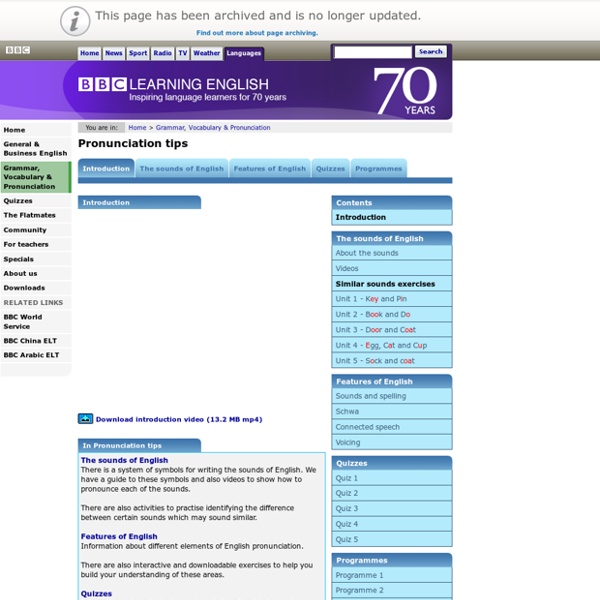No, It’s Not Arbitrary and Does Make Sense: Teaching the English Punctuation System
You might also try putting a period at the end of a “thought.” And what about semi-colons and colons? Well…maybe those are for exceptionally long breaths and thoughts? Okay, I guess you can see that these are no official “Strunk and White” rules about usage but rather the kind of myths about standard punctuation that are perpetuated, sometimes by educators, I’m afraid.
English Pronunciation
We use Cisco wireless in all our buildings for convenient and immediate online access. You will need the following for the files below: English Pronunciation/Listening We use the popular Can8 VirtuaLab for all our digital language lab programs. Unit One: TH, as in THINK, BATHROOM, and TEETH. Watch this QuickTime movie on the word 'Thought' to see how to correctly make the 'TH' sound (894k).
26 Fresh ESL Conversation Starters to Get Students Talking!
10 Oct I love teaching conversation in the ESL classroom. Part of it must be that because the students able to “converse” in English are
Improve English Pronunciation with free podcast
Friday September 19th, 2008 English Pronunciation Podcast 4- Vowels /ɛ / and /eI/: This podcast teaches you how to pronounce /ɛ / and /eI/ accurately with special emphasis on learning how to distinguish between them. In today's podcast, we're going to learn two very important vowels in English: the vowels /ɛ / and /eI/. The focus of today's lesson is: learning and practicing how to pronounce /ɛ / learning and practicing how to pronounce /eI/ Learning how to distinguish between /ɛ / and /eI/ We will learn to develop a clear and distinct pronunciation for /ɛ / and /eI/ . How to articulate /ɛ / correctly:
Teaching Diphthongs
It’s never easy to teach phonetics and even though I love teaching this skill, I don’t think my students share my feelings on this subject. Anyway,in case you find it interesting or useful this is how I’m planning to teach diphthongs . A diphthong is a sound made up of two vowels, or in other words ,a vowel sound that starts near the articulatory position for one vowel and moves toward the position for another.In RP (the approved pronunciation of British English) , there are eight diphthongs. An easy way for them to remember the diphthongs is by drawing a face such as this one and then eliciting the diphthongs in the head. You’ll get seven out of the eight diphthongs as you can see from the picture .
Brilliant toilet!
In this activity, students hear about a strange restaurant recommendation. They watch a video in which Paul talks about a friend’s suggestion to visit a new restaurant in town specifically because of its brilliant toilet. But what could be so special about a toilet? And why is Paul offended by the recommendation? Language level: Intermediate + (B1)Learner type: Teens; AdultsTime: 45 minutesActivity: Reading and speakingTopic: RestaurantsLanguage: Evaluative adjectives (brilliant, wonderful, unbelievable, great, etc.)Materials: Video; worksheet Brilliant toilet (10156 downloads) Lesson plan outline (part 1)
English Online France
Stress and the Schwa Sound Stressed syllabes The rhythm of EnglishThe Schwa soundThe General Rule 1The General Rule 2Words with Latin or Greek suffixes 1Words with Latin or Greek suffixes 2Words in -ion Limericks Limericks are short poems.
Conversation Questions for the ESL/EFL Classroom
If this is your first time here, then read the Teacher's Guide to Using These PagesIf you can think of a good question for any list, please send it to us. Home | Articles | Lessons | Techniques | Questions | Games | Jokes | Things for Teachers | Links | Activities for ESL Students Would you like to help? If you can think of a good question for any list, please send it to us. If you would like to suggest another topic, please send it and a set of questions to begin the topic. Copyright © 1997-2010 by The Internet TESL Journal Pages from this site should not be put online elsewhere.Permission is not required to link directly to any page on our site as long as you do not trap the page inside a frame.
English Sounds and Spelling
1. The Same Letter Can Have Different Sounds Look at these three words: phone, clock, for. These three words all have the letter ‘o’. But is the letter ‘o’ pronounced the same in each word? Listen to the words again: phone, clock, for.
You've Been Saying These Country And City Names Wrong Your Whole Life
No one wants to be labeled as a gawking, uninformed foreigner. Aside from wearing a fanny pack, one of the fastest ways to get yourself labeled as a tourist is to mispronounce the name of the city you are visiting. However, in defense of all those who confuse the proper pronunciation of Ibiza for a seriously strong lisp, learning the proper names of all the places in the world can be a tricky task. Let’s face it, spelling can be deceiving, especially if it’s in a language you don’t know how to speak.
Things 2 do b4 u die
This activity deals with bucket lists – wishlists of things to do before you die (or ‘kick the bucket’). For example: participate in a demonstration; appear on the front cover of a newspaper; be an extra in a film; do a runner from a restaurant; get arrested; photocopy your bottom at work. Language level: Intermediate (B1) +Learner type: Mature teens; AdultsTime: 90 minutesActivity: Grammar drill; SpeakingTopic: Life & deathLanguage: ‘Have you ever …?’ questions; Past simple questions; Pronunciation of regular past participlesMaterials: Materials freeThings 2 do b4 u die [downloaded 6286 times] Disclaimer: Students should be aware that some of the suggestions in this lesson plan are intended only as fun.



